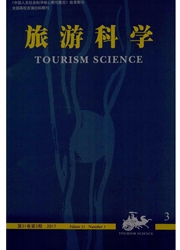

 中文摘要:
中文摘要:
文章运用集对分析法,从旅游经济系统的敏感性和应对性两个方面构建指标体系,测度1983—2011年间中国旅游经济系统的脆弱性。研究表明:我国旅游经济系统整体上敏感性呈上升趋势、应对性呈上升趋势、脆弱性呈下降趋势;我国旅游经济系统敏感性具有高弹性,但其弹性在逐渐降低;近期,我国旅游经济系统脆弱性出现了翘尾现象,说明我国旅游经济系统发展中矛盾在增加。基于实证研究结果,文章认为:旅游经济系统脆弱性可以分为“内生性结构累积式脆弱”和“外生性环境胁迫式脆弱”两种类型;旅游经济系统脆弱性的深层压力,来源于“内生性结构累积式脆弱”的不断积累;利他性的工具性旅游产业政策,在一定程度上会加大后期旅游经济系统的脆弱性风险。
 英文摘要:
英文摘要:
The paper applies SPA to construct an index system concerning the sensitivity and replication of tourism economic system based on set-pair analysis to measure the vulnerability of Chinese tourism economic system from 1983 to 2011. The results show that: On the whole, vulnerability of Chinese economic system show downtrend while the sensitivity and replication shows a rising turn. the sensitivity has a high elasticity but the elasticity gradually decreased; the vulnerability of Chinese tourism economic system has come into a new trend in growth recently showing increasing contradictions. Based on the results of the empirical study, the paper holds the view that the vulnerability of tourism economic system can be divided into two types namely, endogenous structure cumulative vulnerability and exogenous environmental stress vulnerability; the in-depth pressure of the system comes from the continuous accumulation of "endogenous structure cumulative vulnerability" ; and that the altruism and instrumental tourism industry policy will enhance the vulnerability risk of later tourism economic system.
 同期刊论文项目
同期刊论文项目
 同项目期刊论文
同项目期刊论文
 期刊信息
期刊信息
